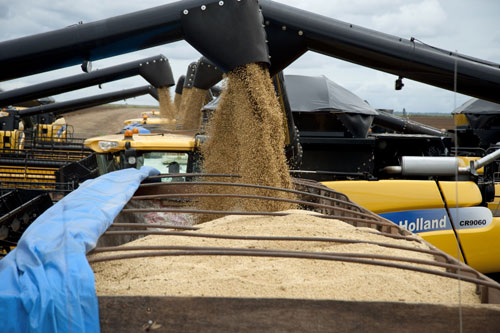CGG is setting up a soybean base in Brazil
Updated: 2011-11-24 10:09
By Bao Chang (China Daily)
|
|||||||||
CHONGQING - Chongqing Grain Group Co Ltd (CGG), one of China's largest State-owned grain corporations, said it will invest $500 million to build a soybean industrial base in Brazil, the second-largest soybean-producing and processing country after the United States.
|
 |
|
Harvested soybeans are transferred into grain carts at the Delta farm in Correntina, Brazil. Chongqing Grain Group Co Ltd will invest $500 million to build a soybean industrial base in Brazil. [Photo/ Bloomberg] |
The planned industrial base, to be built in the northeastern state of Bahia, will require a series of infrastructure projects focusing on the processing, warehousing and logistics of soybeans.
"Establishing a high-quality soybean base with Brazilian farmers, to whom we gladly offer financial support and services, including storage and logistics, is our main goal in the Brazilian market. With the establishment of a comprehensive industrial chain, our purchasing cost for soybeans will be greatly reduced," Hu Junlie, CGG president, told China Daily.
"As our first step, $100 million will be devoted to setting up a soybean pressing plant, which will be completed by the end of next year," Hu said.
The plant, which will start production in 2013, will have an annual capacity of 1.5 million tons of cooking oil, to be sold in the Chinese and Brazilian markets, he said.
After the pressing plant, CGG will set up a soy refinery and processing plants for bio-diesel fuel and soy lecithin products within a few years.
China Radio International Online reported that the Chongqing-based group plans to invest 5.8 billion yuan ($914 million) to plant 600,000 tons of soybeans on 200,000 hectares in Brazil annually.
The project will be the biggest overseas investment made by a Chinese agricultural enterprise and China's largest overseas production base for cooking oil.
Besides CGG, Zhejiang Fudi Agriculture Group and the agricultural bureau of Heilongjiang province have also invested $158.4 million to form a joint soybean-growing venture with a Brazilian partner, according to the Zhejiang province commerce department.
Two farms will be established in the north and south of Brazil.
Other State-owned enterprises are also seeking opportunities to expand abroad, including Chinatex Corp Ltd, the country's largest cotton and soybean trader by revenue, and China National Cereals, Oil and Foodstuffs Corp (COFCO).
COFCO, the country's largest trader of grains and edible oils by revenue, said it will increase investment by more than $10 billion to fund overseas mergers and acquisitions over the next five years.
"The company will make greater efforts in expanding abroad during the next five years, focusing on various markets, including the US, Australia and Southeast Asian nations," said Jiang Hua, a COFCO board member.
Last month, Ning Gaoning, COFCO's board chairman, said the company is seeking foreign investment to help secure overseas commodities such as sugar, wheat and soybeans directly from the source to the Chinese market.
Currently, nearly 80 percent of agricultural oil producing crops in China are imported, mostly from the US and Brazil. Last year, China imported 54.8 million tons of soybeans, and the volume this year will hit 60 million tons, according to the China Nation Association of Grain.
CGG has imported 260,000 tons of soybeans from Brazil this year and the total volume will reach 10 million tons by 2015, reflecting expected sales revenue of 46.5 billion yuan and net profit of 4.2 billion yuan.
Bloomberg reported that global soybean consumption will increase 3.8 percent to 262.24 million metric tons in the year ending Sept 30, 2012, and demand in China, the world's biggest user and importer, will rise 8.6 percent to 71.6 million tons.
"Most Chinese companies import soybeans through the four largest international grain dealers - ADM Co, Cargill Inc, Bunge Ltd and Louis Dreyfus SAS. However, if importers can purchase from the producers, 18 to 24 percent of the profit could be saved," Hu of CGG said.










